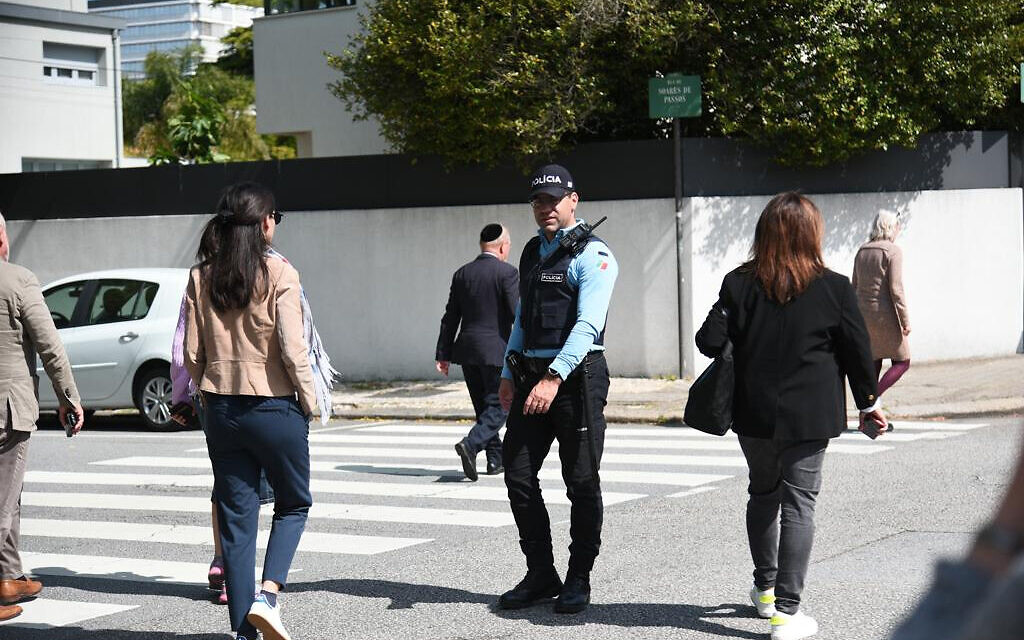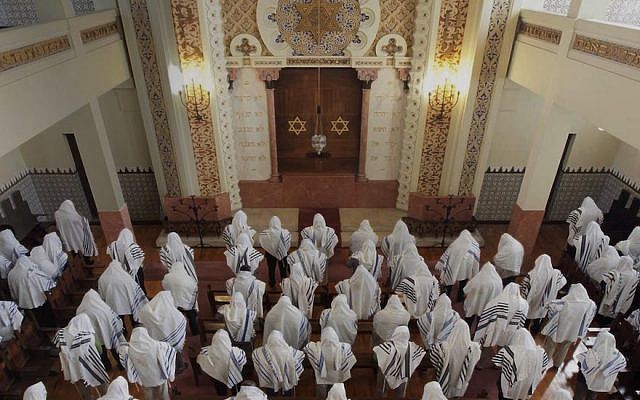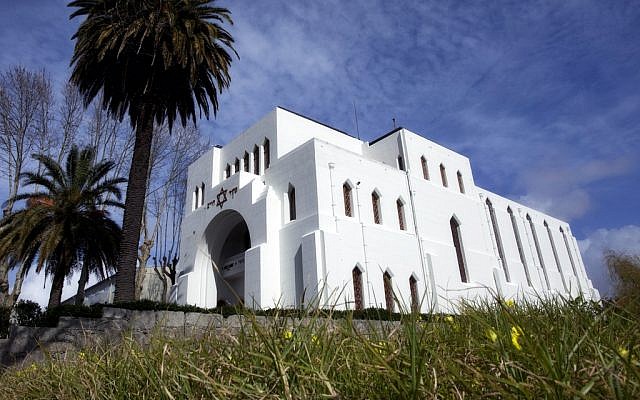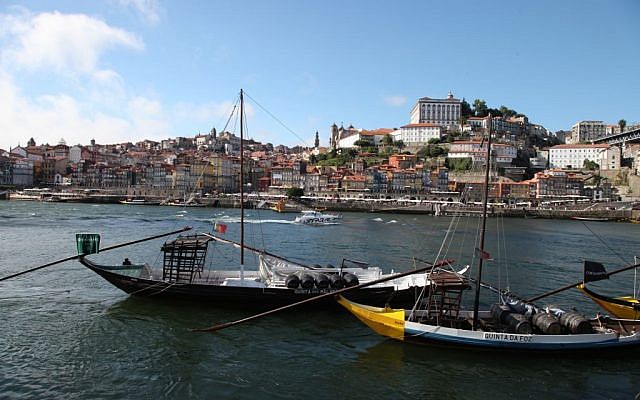Porto Jews decry ‘Soviet-style antisemitism’ as lucrative citizenship vetting probed
Jewish community in coastal Portugal city has flourished, but is now being torn by decision to attack investigation into handling of citizenship process for Jews deemed Sephardic

PORTO, Portugal — If you’re a Jew considering immigrating, your coreligionists in this coastal city would like you to know that it has a thriving, diverse and tight-knit Jewish community with superb amenities that are conveniently located in a modern metropolis where you can live and worship safely.
Also, Porto Jews are the victims of an ongoing campaign of “Soviet-style antisemitism” and intimidation by Portuguese authorities, its leaders recently told dozens of Jewish visitors from overseas.
This conflicted and disputed message, which the community has been propagating in recent months, is the result of intense wrangling over an eight-year-old law that grants Portuguese citizenship to descendants of Sephardic Jews who had been expulsed in the Portuguese Inquisition of 1536.
Celebrated initially for its magnanimity, the pathway was pared back this year amid allegations of fraud involving the Porto community’s role vetting citizenship applications. Criminal probes ensued, prompting claims by the community that authorities were antisemitic. The community now faces counter-accusations that it’s weaponizing the fight against antisemitism to avoid scrutiny.
“I recommend Porto as a destination for Jews who want to live here,” Gabriel Senderowicz, the president of the Jewish Community of Porto, told The Times of Israel in an interview last month at a conference co-hosted by the Jewish Community of Porto for dozens of leaders of other European Jewish communities. “I am happily living here and am perfectly safe walking anywhere wearing a kippah.”
But, he added, “There are state players engaged in an antisemitic campaign of intimidation.”
Portugal’s second city, the picturesque and hilly Porto features a bustling center, tranquil winery district, and sandy beaches. In recent years, Porto’s Jewish community has grown tenfold and today numbers about 2,000, including hundreds of French-Jewish students attending medical school in Porto, according to official community estimates. The community is served by three active synagogues – one of which was built recently.
But the phenomenal growth of the city’s Jewish community is at risk, Senderowicz said. “The problem is not the general population in Porto, it’s the government and the media, which are working together to hurt us,” he told The Times of Israel.
Several members have left because of it, he added, but declined to help a reporter reach out to them. “They are already not here,” he explained.

These claims of antisemitism are a new development. In 2016, the leaders of Porto’s Jewish community hosted at their main synagogue Mayor Rui Moreira, who has Jewish roots, and applauded his statement in a speech that “there is no antisemitism in Porto.”
Hugo Vaz, a senior member of the community, told the JPN news site in 2020 that Portugal “is economically speaking full of opportunities and is uniquely safe and tolerant.” Jews, he added, “feel completely comfortable. They’re not only returning to their roots, but they are also happy here.”
According to the community’s current narrative, its growth and newfound prominence prompted unnamed government agents acting out of hatred of Jews to launch a criminal probe of the citizenship vetting process.

The trigger, they say, was the revelation in 2022 that the community had facilitated the naturalization of Roman Abramovich, a Russian-Jewish billionaire reputed to have good ties with Russian President Vladimir Putin.
The community acknowledges approving Abramovich, but leaders dispute that any laws were broken.
The news about Abramovich broke weeks after Putin’s army invaded Ukraine, drawing sanctions that forced Abramovich to sell the Chelsea soccer team in the United Kingdom amid seizures of his assets there, in the United States, Canada and the European Union.
But his Portuguese passport left him a citizen of the EU, affording him the right to travel and live anywhere in the bloc.
Responding to questions about the lineage of Abramovich, who was born into an overwhelmingly Ashkenazi community, Jewish community representatives have cited affirmations of his Sephardic roots by a leader of Russia’s Chabad community — which also has good ties with Putin. They stress that the government has the ultimate say in who is naturalized.
Daniel Litvak, one of two Porto community rabbis, was briefly detained last year. He was also forbidden to leave Portugal until a court in Lisbon lifted the restrictions, saying authorities had not acted against him on the basis of facts.
Police also raided the community’s main synagogue and confiscated computers as evidence, which resulted in a suspension of application approvals in Porto.
Portugal’s interior ministry has said that at least 30,000 applications out of approximately 90,000 since 2015 have been approved, with many more still pending.
Though the Lisbon Jewish community is also charged with vetting applicants, Porto has handled most of them, according to Paulo Curado, an investigative journalist for the Público newspaper.
Additional names of allegedly wealthy Russians whose applications were vetted by the Porto community have since surfaced in the Portuguese media. On May 13, Público added to the list the names of Alexander Smuzikov, an art collector whose net worth was valued in 2016 at $600 million, and his longtime business partner Alexander Kaplan, who is also a citizen of Israel.

Senderowicz, the Porto community’s president, declined in an email to The Times of Israel to elaborate about Smuzikov and Kaplan except to say they were “certified” by the rabbinate of Russia and in Israel.
The scrutiny that these revelations are inviting is compromising a source of income for the community, which since 2015 had charged thousands of people at least 250 euros per person in fees, described by the community as “donations” for vetting their applications for citizenship.
Curado wrote in an exposé published in February that the Jewish Community of Porto has earned tens of millions of euros from vetting applications.
The community, which only 15 years ago had a single synagogue with a leaking roof and no resident rabbi, has said that these fees were not the main source of funding for its many new amenities and projects. To date, those include a new cemetery, synagogues, two museums and, unusually, several expensive-looking film productions about its own history.
The funding, the community said, came from individual donors whom the community would not name except to say that Abramovich is not among them.
“When I came here in 2017 we struggled to get a minyan,” said Ilan Cohen, a Tunisia-born 23-year-old medical student from Marseille who met his Jewish wife in Porto, referencing the quorum of 10 Jewish men that according to Orthodox Judaism is necessary for some prayers. “Today there’s a wealth of Jewish life that I got to see growing before my unbelieving eyes.”

Other locals also attested to the flourishing of Jewish life in Porto and a dozen Israelis living in Porto told The Times of Israel that they had not encountered any antisemitic hostility there.
The participants of the Jewish leaders’ conference held last month in Porto toured the two apartment-sized museums, including a main space devoted this year to an exhibition on the Porto community’s alleged persecution over the law.
“A group of influential people in Portugal tried to end the Nationality Law in favor of Portuguese Sephardic Jews by means of a defamation campaign against the Jewish communities involved in the certification process,” one placard in the exhibition reads. “People within the Portuguese state apparatus alleged millions in profits earned by the certifying communities and silenced the billions of euros brought by the Sephardim to the Portuguese economy,” it also says.
The museums are situated opposite the community’s Mekor Haim-Kadoorie Synagogue, a 1930s Art Deco brick building with a large, arched entrance featuring three doors with Moorish motifs.

The synagogue, whose interior features thousands of hand-painted azulejos, Portugal’s iconic ceramic tiles, was built by members of the first Jewish community established in Porto after the Inquisition.
The community was founded by Artur Carlos de Barros Basto, an army captain whose ancestors were Jews who converted to Christianity but kept practicing Judaism secretly. He converted to Judaism and led a rejuvenation of Jewish life in Porto during the 1920s and 1930s, but was falsely charged with pedophilia by the right-wing, pro-Fascist dictatorship of António de Oliveira Salazar that ruled Portugal until 1974.
One of the films that the Porto community produced, “Sefarad,” focuses on the life of Barros Basto, often called the Portuguese Dreyfus in reference to the French-Jewish soldier Alfred Dreyfus, who was wrongfully accused of treason. Barros Basto’s granddaughter, Isabel Lopes, is a vice president of the Jewish Community of Porto and led a successful campaign to rehabilitate him in 2012. She referenced her grandfather’s story in protesting the police crackdown.
“I relived the story of my grandfather, the Portuguese Dreyfus when police invaded my house because of slanderous, anonymous denunciations,” she said in a recently released video produced by the Porto community about its legal problems.
The community’s campaign accusing Portuguese authorities of antisemitic persecution is the first such claim in decades by a mainstream Jewish community in Western Europe.
Senderowicz in an open letter last year called the probe of his community “a Holocaust against families” by “agents of the state” using journalists and influencers to “advance antisemitic libel.” These claims were dismissed as false and “absurd” by a former leader of Portugal’s other large Jewish community, in Lisbon, which the government also certified to vet applications, and which is not under a criminal probe.
The Jewish Community of Lisbon in a statement this month wrote that it “rejects the idea of a state-organized policy of intimidation and persecution of Jews” in Portugal. Its spokesperson added: “The issue of antisemitism is too serious to make allegations that have no correspondence with reality.”
Senderowicz told The Times of Israel that he thought that the Lisbon community’s rejection of his community’s claims was the result of multiple disagreements in recent years.
“They had an opportunity to betray us,” he said, charging that the Lisbon community was being “used to legitimate the fight” against Porto’s Jews.
“This was very bad for us,” he said.
But others have also raised accusations, including a Portuguese-Jewish resident of Porto, who called the community a “criminal enterprise disguised as a Jewish community.”
The source, who spoke to The Times of Israel anonymously citing their fear of retribution by community leaders, said the Porto community’s allegations about antisemitism were a “smokescreen to hide their corruption handling applications.”
They and several others told The Times of Israel that the community is effectively run by a single figure, Francisco de Almeida Garrett, whose aunt Maria de Belém Roseira co-sponsored the bill that led to the citizenship law as president of Portugal’s Socialist Party.

A community representative responded that “the leadership has seven members who decide by majority and the members of the community are Jewish according to the Halacha.”
The allegations against the community coincide with a wave of anti-corruption sentiment, driven in part by the rise of the Chega party, a right-wing movement with an anti-establishment message, whose name means “enough” in Portuguese.
In May, police arrested a deputy mayor of a suburb of Porto along with two real-estate moguls, one of them an Israeli named Elad Dror, on suspicions, which they deny, that they were involved in an unrelated 300-million-euro corruption scam.

“There’s growing scrutiny and revelations against the Porto Jewish community in a climate that’s less tolerant of corruption,” Curado told The Times of Israel. “It seems like the Jewish Community of Porto has decided to go on the offense to deflect blame and try to intimidate authorities and the media out of holding it accountable. So far, it’s not working.”
At the Jewish leadership conference, dozens of senior figures from European Jewish community sat in silence following a screening of a 7-minute video titled “Soviet Style Antisemitism in Portugal.”
The video, which was made by the community and features its leaders, implies that people involved in the alleged antisemitism are behind at least two alleged break-ins into lawyers’ offices and the alleged puncturing of the tires of a car belonging to a student affiliated with the community who had protested the police probe.
People “convicted of defamation and acts of discrimination and people with psychiatric problems were used by the Lisbon elites to make slanderous, anonymous denunciations against the Jewish community of Oporto,” a narrator states in the film, uploaded to YouTube in March. “Lisbon elites trafficked favors with a journalist so the latter would slander the Jewish community of Oporto.”
Breaking the silence, Porto Jewish Community board member Michael Rothwell assured the viewers: “These are not conspiracy theories. You just have to look at the facts.”
Under regulations introduced following the police raids, new applicants for citizenship need to prove a connection to Portugal, such as inheritance of a property in Portuguese territory or proof of visits to the country.
Those requirements are similar to the ones introduced by Spain, which had passed a Sephardic law of return of its own shortly after Portugal. It closed the eligibility window last year after approving at least 36,000 applications out of more than 150,000 received. But allegations of corruption also marred the Spanish law toward the end of its run.
The Portuguese parliament is also reviewing a bill proposing to end the law of return altogether in 2024.

Gonçalo Quelhas Lima, a Porto jurist whose grandfather was Jewish, is suspending his judgment on the local community until the investigation is exhausted. If it reveals corruption, it would make him indignant, he said, because of the breach of trust this would constitute.
“Mostly, though, my indignation would owe to how that corruption stained, yet again, the legacy of Barros Basto, who sacrificed so much to elevate Porto Jews out of oblivion,” Quelhas Lima said.
There's no paywall on The Times of Israel, but the journalism we do is costly. As an independent news organization, we are in no way influenced by political or business interests. We rely on readers like you to support our fact-based coverage of Israel and the Jewish world. If you appreciate the integrity of this type of journalism, please join the ToI Community.

We’re really pleased that you’ve read X Times of Israel articles in the past month.
That’s why we started the Times of Israel eleven years ago - to provide discerning readers like you with must-read coverage of Israel and the Jewish world.
So now we have a request. Unlike other news outlets, we haven’t put up a paywall. But as the journalism we do is costly, we invite readers for whom The Times of Israel has become important to help support our work by joining The Times of Israel Community.
For as little as $6 a month you can help support our quality journalism while enjoying The Times of Israel AD-FREE, as well as accessing exclusive content available only to Times of Israel Community members.
Thank you,
David Horovitz, Founding Editor of The Times of Israel










